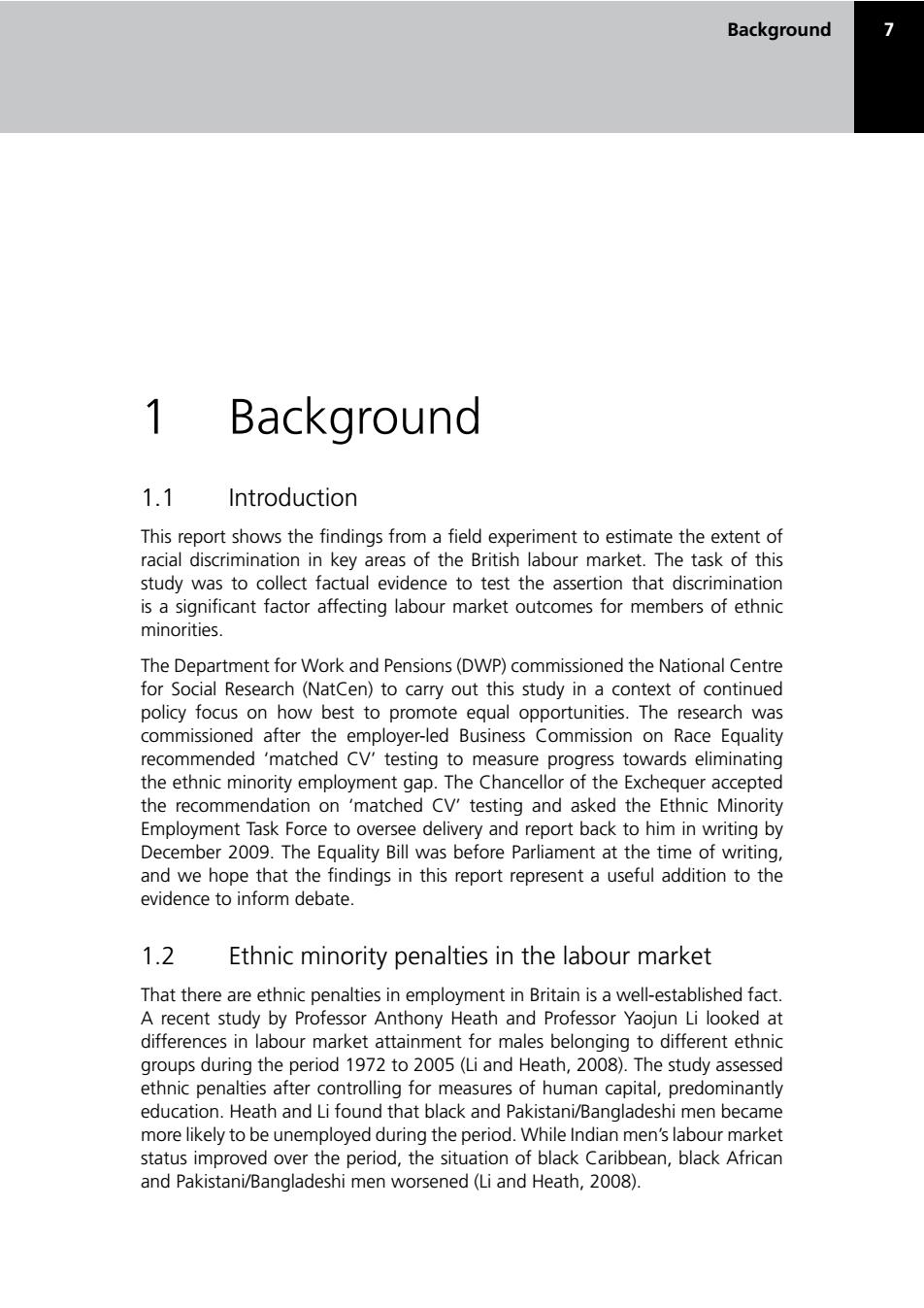正在加载图片...

Background 1 Background 1.1 Introduction This report shows the findings from a field experiment to estimate the extent of racial discrimination in key areas of the British labour market.The task of this study was to collect factual evidence to test the assertion that discrimination is a significant factor affecting labour market outcomes for members of ethnic minorities. The Department for Work and Pensions(DWP)commissioned the National Centre for Social Research(NatCen)to carry out this study in a context of continued policy focus on how best to promote equal opportunities.The research was commissioned after the employer-led Business Commission on Race Equality recommended 'matched CV'testing to measure progress towards eliminating the ethnic minority employment gap.The Chancellor of the Exchequer accepted the recommendation on 'matched CV'testing and asked the Ethnic Minority Employment Task Force to oversee delivery and report back to him in writing by December 2009.The Equality Bill was before Parliament at the time of writing, and we hope that the findings in this report represent a useful addition to the evidence to inform debate. 1.2 Ethnic minority penalties in the labour market That there are ethnic penalties in employment in Britain is a well-established fact. A recent study by Professor Anthony Heath and Professor Yaojun Li looked at differences in labour market attainment for males belonging to different ethnic groups during the period 1972 to 2005 (Li and Heath,2008).The study assessed ethnic penalties after controlling for measures of human capital,predominantly education.Heath and Li found that black and Pakistani/Bangladeshi men became more likely to be unemployed during the period.While Indian men's labour market status improved over the period,the situation of black Caribbean,black African and Pakistani/Bangladeshi men worsened (Li and Heath,2008)Background 7 1 Background 1.1 Introduction This report shows the findings from a field experiment to estimate the extent of racial discrimination in key areas of the British labour market. The task of this study was to collect factual evidence to test the assertion that discrimination is a significant factor affecting labour market outcomes for members of ethnic minorities. The Department for Work and Pensions (DWP) commissioned the National Centre for Social Research (NatCen) to carry out this study in a context of continued policy focus on how best to promote equal opportunities. The research was commissioned after the employer-led Business Commission on Race Equality recommended ‘matched CV’ testing to measure progress towards eliminating the ethnic minority employment gap. The Chancellor of the Exchequer accepted the recommendation on ‘matched CV’ testing and asked the Ethnic Minority Employment Task Force to oversee delivery and report back to him in writing by December 2009. The Equality Bill was before Parliament at the time of writing, and we hope that the findings in this report represent a useful addition to the evidence to inform debate. 1.2 Ethnic minority penalties in the labour market That there are ethnic penalties in employment in Britain is a well-established fact. A recent study by Professor Anthony Heath and Professor Yaojun Li looked at differences in labour market attainment for males belonging to different ethnic groups during the period 1972 to 2005 (Li and Heath, 2008). The study assessed ethnic penalties after controlling for measures of human capital, predominantly education. Heath and Li found that black and Pakistani/Bangladeshi men became more likely to be unemployed during the period. While Indian men’s labour market status improved over the period, the situation of black Caribbean, black African and Pakistani/Bangladeshi men worsened (Li and Heath, 2008)